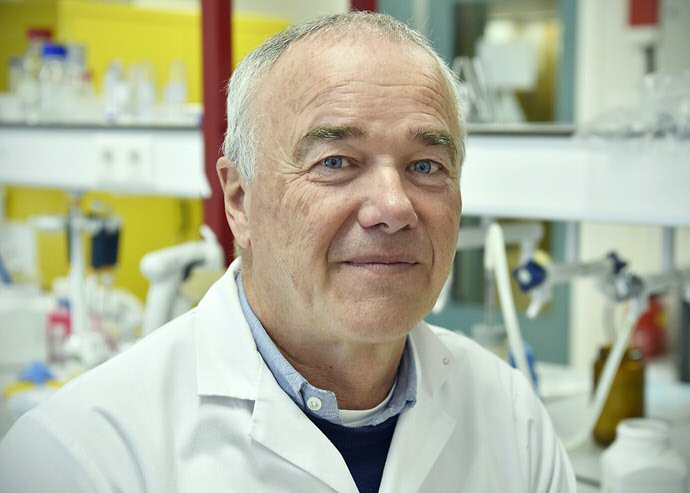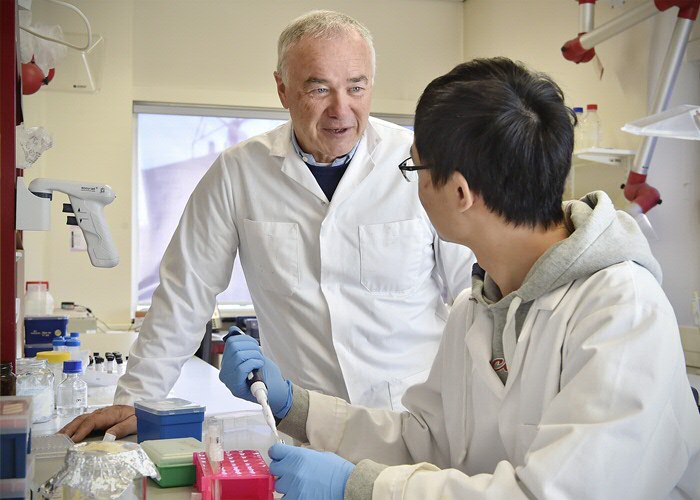Suspicious genes, fast legs

He is putting the finishing touches to a test that can reveal gene doping. However, Hidde Haisma, Professor of Pharmaceutical Gene Modulation at the University of Groningen and affiliated with the WADA (World Anti-Doping Agency), has a nuanced attitude towards doping users. He wants to protect sportspeople rather than sport itself. ‘Under pressure, top sportspeople do crazy things’, he says.
Text: Eelco Salverda, Communication UG / Photos: Elmer Spaargaren
Over the past two years, Haisma has been working with his colleagues on a new test that can detect gene doping. He is clear about his motives and the possibility of a doping-free world. ‘Without a good test, accidents will happen. I’m quite aware that the struggle against doping will not stop after our test. Many regimes and many individuals are willing to go a very long way to achieve a top performance. That’s why we need to protect sportspeople from themselves and others. I’m really not in favour of government control and monitoring of all kinds of things, but in this case I am absolutely in favour. Otherwise, people will die.’
Ordering EPO genes
Haisma talks calmly and comprehensibly about his research. It is easy to see that he is used to not only communicating with colleagues. Although gene doping is not solely about EPO genes, Haisma takes them as an example. ‘EPO is a hormone that everyone produces in their kidneys. It stimulates the production of red blood cells. You can have EPO injections, a known form of doping. But everyone also has a gene for the EPO hormone, and you can also inject that. Then your muscles start to produce EPO, so that you get more red blood cells. This is what we mean by gene doping.’ Injecting a gene: it sounds like science fiction, but it’s actually pretty simple. ‘You know, you can just order the EPO gene online. There is no law against selling it. A journalist once ordered it right here. And in principle, you can also inject it yourself.’
Short genes
The use of gene doping has never been proved, even though an older test exists. However, developing a test is just the first step. ‘Laboratories in every country must be able to perform the test and the result must be legally incontestable. This is a long process, and that is why sportspeople have not yet really been tested.’ How does a test like this actually work? ‘Our EPO gene also contains what we call “junk DNA”, which is not relevant to producing EPO. Because of this, the EPO gene is too big to use, which is why you cut out about ninety percent of it and the remainder is what you inject. The current test looks for genetic material that is a lot “shorter” than ordinary genes.’
More accurate testing
Over the past two years, Haisma has been working on a different, better test. What has motivated him, apart from wanting to prevent accidents? ‘Really just curiosity, wanting to develop something further. There is already a test, but we can do better. That idea. If you don’t have that attitude, I don’t think you belong at university.’ The new test is more accurate than the one that already exists, according to Haisma. ‘An EPO gene is almost 100 percent the same in everyone, but there will always be a tiny difference between your DNA and my DNA. Our test can detect that 0.01 percent difference between a person’s own genes and “alien” genes. We have now demonstrated that it works, but we still have to examine its sensitivity and how easy it is to perform in a lab. By the end of this year, I expect to be able to report to the WADA.’ Haisma, himself a tennis player and sailor, is one of the experts in the field worldwide. Normally, his research focuses mainly on gene therapy. ‘Until two years ago, I hadn’t done any research on gene doping. It is actually a hobby that got out of hand’, he says with a smile. But it is a hobby that has made him think.

Coping with pressure
It is almost impossible for anyone involved in doping research to avoid moral issues. Was the new test the result of a sense of justice? How does Haisma judge people who use doping? It turns out he is above all a nuanced pragmatist who wants to prevent accidents. He cares about people involved in sports, who can get so tangled up in the world of food supplements and medications, of expectations and disappointments. ‘I am often asked if it would not be better for us to simply allow doping. My answer is no, because sportspeople would not know when to stop. There is an incredible amount of pressure on them. Everyone wants to see gold: coaches, sponsors, the public. The WADA always uses the term “spirit of sport”, the “Olympic idea” shall we say, playing sports in an honest way. Of course we should be doing that. But on the other hand, the era of Atje Keulen-Deelstra is over. It is also just work, with major interests and a lot of coaching.’
More and better
Citius, altius, fortius : the motto of the International Olympic Committee. Faster, higher, stronger. But is that still possible without doping? Won’t spectators and sponsors lose interest if there are no records? We are all part of the theatre in which sportspeople play their sometimes lonely and unrewarding leading roles. You might wonder if a doping user is a perpetrator or in a certain sense a victim. ‘A perpetrator who cannot be held accountable, I would say’, smiles Haisma. ‘Because you can do crazy things under pressure, but also because as a doping user you don’t really know what you’re doing – and doping can be very dangerous.’
Naive
If you produce too many red blood cells because of EPO, you can get blood clots, with all that that entails. ‘Apart from that, there’s the problem of the right dose. It can take up to a week before you notice anything. But once it’s injected, there’s nothing you can do about it. Sportspeople don’t really understand what they’re doing.’ Haisma thinks sportspeople are often naive. ‘They don’t have much knowledge about what you can and can’t do, or of what can go wrong. They have a whole team of doctors, physiotherapists and dieticians who they rely on heavily. They focus on training and competitions. This is understandable, but it does lead to a certain naivety. That worries me. You have your own responsibility as well: you shouldn’t simply do whatever your team tells you, without any questions.’
Detective
Although there is no proof that sportspeople use gene doping, Haisma has his suspicions. ‘It’s possible, so it probably happens. It is known that a coach once got in touch with a company that supplies that EPO gene. And I myself was once approached via email. Someone pretended to be a police officer doing research who needed a package of EPO genes.’ He chuckles at the memory. ‘I smelt a rat at once and after a few phone calls it turned out that that police officer didn’t exist.’
More news
-
29 January 2026
Microplastic research - media hype or real danger?
-
27 January 2026
ERC Proof of Concept grant for Maria Loi
